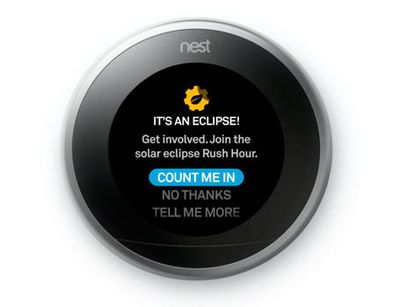Smart thermostat company Nest this week announced a new energy saving initiative coming on the day of the total solar eclipse, August 21, 2017. During the eclipse, clean solar energy will be reduced and in some areas of the United States traditional power plants will have to fire up in order to cover the energy shortfall for a brief period of time.

Nest's solution is a "Solar Eclipse Rush Hour" setting that will be sent to thermostats across the U.S. days ahead of the eclipse. The program will help offset the drop in energy production during the eclipse by automatically pre-cooling homes ahead of time. Once users notice the message, and agree to participate, the Nest Thermostat will lower the temperature of their home before the eclipse.
So, we’re encouraging people across the US to help offset this drop in energy production by pre-cooling their homes before the eclipse. If you don’t own a Nest thermostat, you can manually adjust the temperature by one or two degrees during the eclipse. If you join, a few hours before the eclipse hits your area, your Nest Thermostat may automatically pre-cool your home so that you can save energy during the eclipse. After the eclipse, your thermostat will go back to its regular schedule.
The company said that with enough Nest devices participating, users will be able to "meaningfully reduce" energy demand during the eclipse. Of course, if the temperature becomes too warm during the time of the eclipse, users can still manually change the temperature at any time. Once the eclipse has ended, Nest will go back to its regular schedule of warming and cooling.
Nest's new Solar Eclipse Rush Hour is part of the Rush Hour program that began back in 2013, which has a similar energy-saving goal. In that program, Nest Thermostats warn users of when a high-demand energy period is coming, particularly during warm days when many people will activate their air conditioners. If participating, Nest will automatically pre-cool the home and keep its energy output low during the Rush Hour -- enough to keep users comfortable -- and then return to regular programming afterward.
Over the summer, a rumor came out that Nest was potentially considering adding HomeKit support into its smart thermostat products. However, a subsequent report that cited a Nest employee said that the company has "no immediate plans" to support Apple's smart home platform and "no roadmap" for such an update. Apple has a few smart thermostats it highlights and sells in the HomeKit section of its online store, including those made by ecobee, iDevices, and Honeywell.
In regards to the eclipse, the partial phase will hit Oregon at around 9 a.m. PT on August 21, with totality occurring about one hour later. For more local times on when the eclipse will be near your area, and the safety precautions you should take when trying to view the event, check out NASA's web page.




















Top Rated Comments
Also temperatures will drop during the eclipse anyway due to the sun being obscured.
[doublepost=1502473642][/doublepost]The last eclipse I watched, the street lights came on automatically. And no, the solar power generation doesn't just go down for the few minutes of the total eclipse but over a few hours, depending on how large the relevant electrical grid area is. Here are a couple of graphs from two ('https://blogs.oracle.com/utilities/germany-solar-eclipse') articles ('http://grist.org/climate-energy/what-will-a-solar-eclipse-mean-for-solar-power/'):
What also matters is the rate of change:
How much this poses a problem depends on many factors. Foremost probably the percentage of PV in the total electricity supply at the time of the eclipse (which among other things depends also on the weather, the time of day) and secondly how flexible the grid and other power sources are (including storage systems from pumped storage to batteries). If an eclipse hits an island that is not connected to a wider grid (eg, Hawaii), things get more critical.